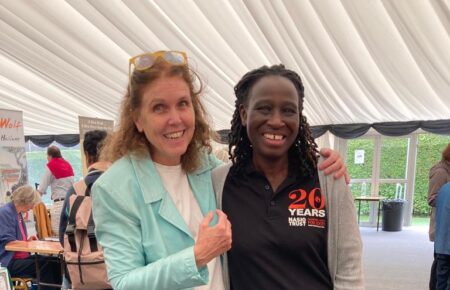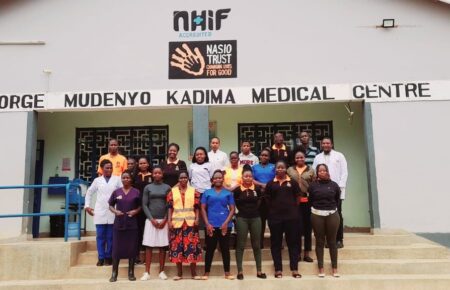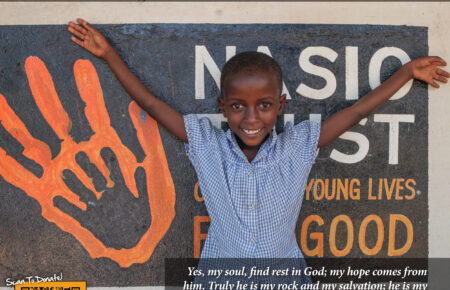Publishing in Africa at the London Book Fair By Katie Isbester
April 2024
In further support of the Nasio Trust’s Library appeal, Katie Isbester talks about her recent trip to the London Book Fair and a fortuitous discovery!
I didn’t mean to go to the talk. There were some 30,000 people at the London Book Fair and I was supposed to meet at least a few of them. Instead I found myself going to a talk on publishing in Africa because of Nasio Trust. I knew it was trying to build a library, the first of its kind in Western Kenya, and I was rather curious.
The talk was called “New Trends in Publishing in Sub-Saharan Africa”. While it may have sounded dull, the talk was actually quite engaging. I could see an industry birthing itself with all the associated aches and pains.
Before I go further, let me suggest typical pre-conditions for publishing to thrive.
- Broad and deep literacy. Literacy has to be broad because not everyone wants to spend their evening reading a book. The more who read, the greater the market segment who might feel so inclined. And it has to be a deep literacy so that reading is not work but a pleasure – a Sunday afternoon or an early night with a new novel. These correlate to a middle-income status.
It has to be pointed out that one person’s middle income is not another’s, and it would very wrong to think that a country which has middle-income status is therefore middle class. And this matters because books are a luxury item. You need disposable income to buy one. And disposable income in middle-income countries is thin.
- Economic infrastructure. Publishing is way more complicated than you’d think. It’s deep water ports to bring in big shipments of paper and machinery (plus a whole load of other stuff). It’s railroads to bring goods to warehouses, and roads to distribute stuff to shops. It’s banks that offer credit and banking operations that make it easy to take and spend money.
- Social infrastructure. Are libraries stocking books? Are there libraries at all? Bookstores for people to buy books for themselves or as presents? Is there a culture of launches and book festivals? Are people even willing to spend money on a book? For example, Asia is a tough market to sell books to because they don’t have a culture of pleasure reading. Books to help their children to their maths homework, no problem. Memoirs by sports or pop stars, absolutely. History, geography, science, sure. But novels for the sheer pleasure of being lost in a good book? Not so much.
These three criteria have to exist before a local business can take the risk of investing capital – and not just publishing but every business. And in some ways, that has already happened. 95% of the population has a smartphone, which requires the internet and literacy and mass take up. But it’s easier to use a smartphone than to ship books across the country.
Africa has some unique challenges:
- Getting hold of the books. There are few printers. There are too few roads. Books get printed up in South Africa (which has the ports for paper importation) and shipped by lousy roads around Africa. Truth be told, printing and then distributing throughout the towns and cities of Africa is not really working.
- People want to read stories about themselves set in their own traditions and landscape. They’re tired of reading about a murder mystery in New York or Oxford.
I get that. I come from Canada. All the movies and TV shows I watch are set in a different country. There is a comfortable remove from the crime and murder mysteries. Same with the books.
I was surprised when I arrived in London how many British films and TV shows did not cross the Atlantic and be shown in Canada. And that’s with a common language. When I went to other countries in Europe, the gap was more pronounced. Who knew that the Danish (population 6 million) had such a robust film and TV industry?
Basically, if a country has the wherewithal, it tells itself its own stories. They’re not necessarily intended for export; they can survive on domestic consumption alone.
So the problem for publishers in Africa is finding authors telling stories about their locale. And they need to write them in their own language, and since language usage is fragmented, also in English.
- There is no cross-country dialogue among the few publishers that do exist to help each other and to build the publishing industry. This is not assisted by the success stories: once a publisher gets some traction, it moves to the UK and operates out of there. For a region to be vibrant, the success stories need to stick around. In Canada, the success stories migrate south of the border. In Africa, they migrate north.
- Publishers are not selling on their rights, using well established copyright and licensing laws, to augment their income and establish the practice of intellectual property rights. Which is just annoying.
But look, it’s not all doom and gloom. Quite the contrary.
Despite what I said above, what’s happening now is all rather exciting.
With the odds stacked against them and lacking many of the prerequisites for doing business, they’re nevertheless doing business. It’s impressive. I found myself smiling as they recounted the innovative practices publishers were using.
Here are some of them:
- The traditional distribution method of printing and shipping to warehouses before getting copies in bookstores is not working. So don’t do it. Don’t even try.
Instead publishers, recognising that 95% of the population has a smartphone, are creating WhatsApp groups to share taster chapters and videos, directing consumers to publishers’ websites where they can buy the whole book for a larger sum or chapters for a smaller sum.
Because so many consumers are visiting the publishers’ websites, the websites can host advertising. The WhatsApp groups can host advertising. That helps to offset the cost of producing the book, reducing the risk for the entrepreneur. So publishers are by-passing tradition altogether and going directly to high tech. It’s cheaper and risks substantially less upfront capital. And that permits more people to enter the business, and in theory, reduces the costs for the reader. - Graphic novels and comics are prominent. This gets everyone used to the idea of pleasure reading. It also helps people to read English (if it’s not their first language) or read the indigenous language (which is frequently not as familiar to read). Because the image does the heavy lifting of the storytelling in graphic novels, it’s cheap and easy to replace the text. So one graphic novel can be produced in multiple languages of the region and continent. This makes graphic novels a volume good with (in theory) savings carried over to the reader. Again this makes reading a more attractive leisure activity.
- Schools are banding together to create book clubs. Collectively, the schools get a stock of one title, distribute them among the students at one school for a set period (let’s say 2 months), then that school collects them up and send them to the next school, which does the same. Then the students from all the schools get together to discuss the book. It’s fun. It’s affordable. It’s communal. No one wants to be left out of the party, so as many students as possible read it.
- The warp and weft of publishing is small businesses run by women. They start by publishing themselves, and maybe their friends and sisters. These are women’s stories meant for women, sold to their friends. The occasional woman then turns that initiative into a business, selling more stories. Mighty oaks from little acorns grow.
- Probably my favourite practice, that I think will have the most impact, is the creation of book festivals. Except these festivals are not just about books. They are about the spoken word and dramatised storytelling, song and dance, and even cinema. It treats books as part of a larger cultural and communal happening and something to revel in. Book fests normalise books and reading for pleasure. Book fests make reading a collective engagement. Book fests make it fun.
And who doesn’t love fun?
I don’t want to gild the lily and suggest that here on in, it’s all downhill, it’s easy-peasy. This is the rebirth of an industry using 21st century technology embedded in established cultural practices. It is fostering local entrepreneurship, especially of women, by bringing stories that people could not otherwise access.
I have not yet mentioned this important fact: the British Council has been facilitating the development of publishing in Africa by researching what is happening, bringing publishers together to share practices that work, and then reporting back to us. Given that it’s Britain, I’m pretty sure that it was done on the smell of money.
Nasio Trust’s library would be an important contribution to deepening literacy, developing a culture of book reading and fostering others’ entrepreneurship. These three things assist with economic growth and prosperity, good health and well-being, and community networks.
I have to say, that’s quite a return on your investment given that it’s just a local library. Plus people get a great read out of it too. What a deal.




